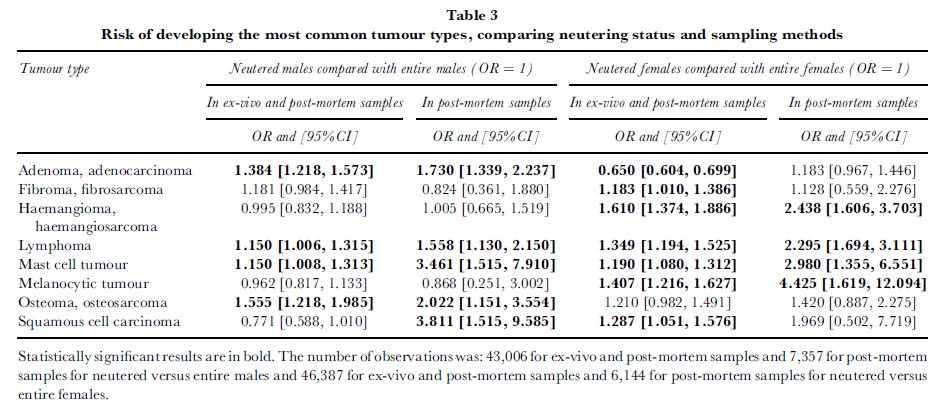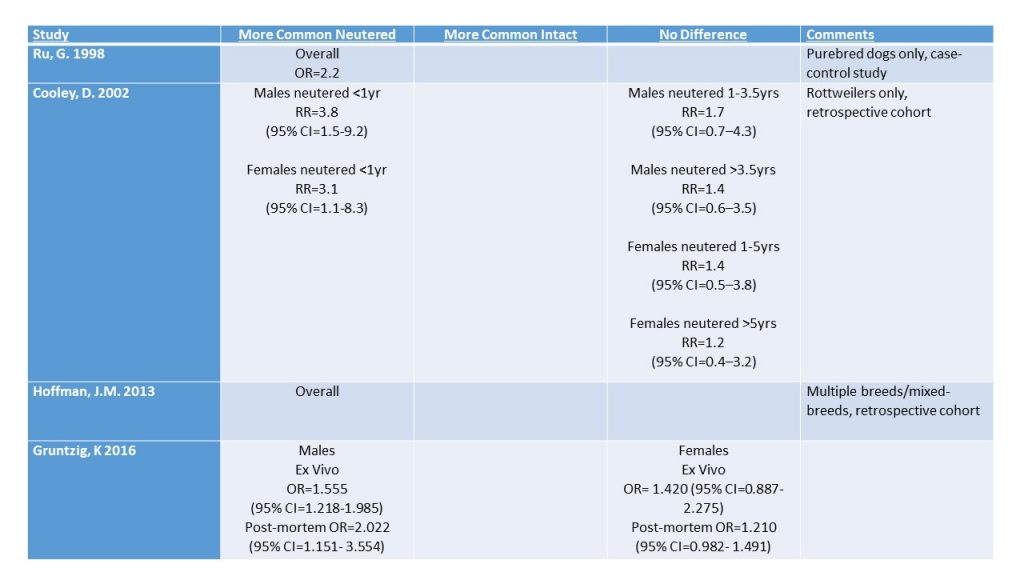I have written extensively about the risks and benefits of neutering in dogs and cats. This is an area of active research, and new data emerge regularly to challenge existing beliefs and illustrate the amazing complexity of living organisms and he factors that lead to disease. One subject within this larger field concerns the effects of neutering on cancer risk. The data is complex and inconsistent, but there are some trends that emerge from multiple studies of different types in various populations. Some cancers almost certainly occur less often following neutering, and others almost certainly occur more often, and this relationship is heavily influenced by genetics, most clearly manifested as different effects of neutering on cancer risk in different breeds. A new publication has added a bit of evidence to this subject, which provides a good opportunity to review what we know and don’t know.
Grüntzig K, Graf R, Boo G, et al. Swiss Canine Cancer Registry 1955-2008: Occurrence of the Most Common Tumour Diagnoses and Influence of Age, Breed, Body Size, Sex and Neutering Status on Tumour Development. J Comp Pathol. 2016 Aug-Oct;155(2-3):156-70.
This study looked retrospectively at biopsies of both living and deceased dogs included in a cancer registry that has been collecting data since 1955 and compared the results with other information about these dogs, including age, breed, and neutering status. The general findings confirm the results of previous research, showing that cancer risk typically increases with age, that different breeds have different overall cancer risk as well as predisposition to different types of cancer, and that there are exceptions to almost any generalization one can make about cancer in dogs. These are certainly not surprising findings, and they generally confirm the results of other studies.
One finding that was a bit surprising was that mixed-breed dogs did not appear to be at lower overall cancer risk than purebred dogs, which has appeared to be the case in other studies. The difference between the populations studied or the methods used may be responsible for the different findings, but it raises some doubts about the general assumption that purebred dogs are more likely overall to get cancer than mutts.
In terms of cancer risk and neutering, the findings are summarized in the following table. This compares the odds of cancer in neutered and intact animals, separated both by sex (males and females) and also by the method used to detect the cancer (biopsy samples from living animals compared with post-mortem samples from deceased animals). The odds ratio is given, indicating the odds of a particular cancer in the indicated group compared with intact animals of the same sex using the same detection method.
In general, these data confirm the findings of several other studies, though there are differences. Neutering appears to reduce the risk of adenocarcinomas, especially in females. This primarily relates to breast cancer, which occurs much, much more often in intact females than in neutered females or males. Other types of cancer either showed no difference in risk with neutering or appeared to be more common in neutered animals of one or both sexes.
The differences in odds were consistently larger in post-mortem samples. This reflects a source of bias in the data. Samples of testicles and mammary tissue from living animals undergoing surgery are likely commonly submitted, while samples of other types of cancer from other organs are much less likely to be analyzed and submitted to the registry. This influences the numbers of cancers of different types seen, and means that post-mortem submissions are more common for most tumors except breast and testicular tumors, which are more likely to be sampled in animals that are neutered. In any case, the study accounted for this source of bias by separating the data as seen in the table.
The best way to identify real trends is to compare data from different studies, often involving different populations (ages, breeds, geographic locations, etc.) and study methods (clinical patients, cancer registry studies, pathology lab studies, insurance company data, etc). I have collected results from various studies comparing risk between neutered and intact males and females for the types of cancer most commonly thought to be influenced by neutering (other than mammary cancer, of course, which is quite clearly less common in neutered females than in intact females). These data show both some patterns suggesting an increase in the risk of several cancers with neutering as well as some inconsistency in the data, indicating this risk varies by breed and sex and possibly other population factors.
Studies involving neutering and osteosarcoma risk.
Studies involving neutering and mast cell tumor risk. 
Studies involving neutering and lymphosarcoma risk.
Studies involving neutering and hemangiosarcoma risk.














” Neutering appears to reduce the risk of adenocarcinomas, especially in females. This primarily relates to breast cancer, which occurs much, much more often in intact females than in neutered females or males. ”
I’m confused.. in that table it shows the risk for neutered male is 1.384 of risk for intact males, obviously higher??
Thanks, your site is just awesome 🙂
Yes, the word “especially” should come out of that sentence. You are correct that adenoma and adenocarcinoma risk was higher in neutered males than in intact males. However, mammary adenocarcinomas are quite common in intact females, whereas in males they are so rare that the statistical difference between neutered and intact males may not make a real-world difference.
Hello, I have been seeking information about the risk of TCC of the bladder in male Westies – intact vs neutered. This is a subject on which several vets caring for my puppy appear to have no opinion. Have you encountered or reviewed any articles on this topic?
Here is the brief section of my review that addresses what we know about this issue:
Transitional cell carcinoma is a cancer of the lower urinary tract, usually found in the bladder and uncommonly in the urethra of dogs.[77] It represents 1%-2% of canine cancers and is rare in the cat.[77,78] Transitional cell carcinoma is an aggressive cancer with a fair long-term prognosis, and it is usually treated with chemotherapy and sometimes surgery or radiation therapy.[77] It is more common in females than males, prevalence varies by breed, and neutered animals have been reported to be at greater risk than intact animals.[78,79,217]
77. Knapp DW. Tumors of the urinary system. In: Winthrow SJ, Vail DM, editors. Withrow and MacEwen’s Small Animal Clinical Oncology. 4th ed. St. Louis (MO), USA: WB Saunders Elsevier; 2007. p. 649-58.
78. Norris AM, Laing EJ, Valli VE, Withrow SJ, Macy DW, Ogilvie GK, et al. Canine bladder and urethral tumors: A retrospective study of 115 cases (1980-1985). Journal of Veterinary Internal Medicine 1992;6(3):145-53.
79. Knapp DW, Glickman NW, DeNicola DB, Glickman LT. Naturally-occurring transitional cell carcinoma of the urinary bladder. Urologic Oncology 2000;5:47-59.
217. Hoffman JM, Creevy KE, Promislow DEL. Reproductive Capability Is Associated with Lifespan and Cause of Death in Companion Dogs. PLoS ONE. 2013;8(4): e61082. doi:10.1371/journal.pone.0061082
I have 2chihuahuas boy 5yrs girl 2 yrs.not been bred .which would you advise to neuter please ?thank you
As you can see from the article, there is no simple answer to this question, and it requires considering the research evidence and the details of you and your dogs’ individual circumstances. This is the sort of conversation you need to have with your own local vet.
Hi. Thanks for this post. My male Labrador is not neutered yet, I had planned to have him done this winter. He is 2.5 years old. However, today he had an aspirate done on what appears to be a mast cell tumor. (I will have the definite results Monday). Initially, I thought if it was mast cell, I would have the tumor removal and neuter done together (ASAP, rather than over the winter), so that he would only need to be put under anesthesia once, but after reading this and a few similar articles, I am wondering if I should have him neutered at all…if it is a mast cell tumor as suspected. I am a responsible pet owner and he doesn’t roam, mark indoors, etc., so maybe it isn’t worth the risk since he is so young to have mast cell in the first place and may be prone to it? I will also as my vet, but was wondering your opinion?
Interestingly, the research so far on neutering and mast cell tumors (MCT) doesn’t really show a connection for males, and several studies have looked specifically at labs, which appears to be a high-risk breed fr this condition. My guess is that neutering wouldn’t likely have much impact on his risk, and obviously he’s already developed one even though he is intact. On the other hand, if he has no health or behavioral problems that neutering is intended to improve (e.g. prostate disease, aggression to other dogs), then there is probably no benefit in neutering him, so I don’t see a compelling reason to do so even if it doesn’t effect the risk of MCT.
Good luck!
Thanks so much for your reply. I had continued my research yesterday and came across another study showing that intact males have a greater risk of higher grade mast cell tumors, so I think I am leaning towards the neuter now. Being a responsible pet guardian and making the correct decision for your pet is confusing for sure! Thanks again for your helpful blog. If you are interested in that study, you can find it here: https://www.cuvs.org/sites/default/files/inline-files/1-4%20Bentley%20Thalheim%20-%20SpayNeuter.pdf
I have a 2-year old Bernese mountain dog who is very mellow and well behaved. He does not show signs of aggression nor does he mark in the house. His only behavior issue is that he sometimes pulls on his leash and has tried to run after a female dog in heat. Being that he’s 120lbs it can be difficult to control him if he really wants to pull away from me. The vet has said that neutering is beneficial because it reduces the chances for testicular cancer, but what are the chances of his breed getting that disease? The vet also said that neutering would make him less sexually frustrated and perhaps a little less anxious. What are the cons to neutering a male Berner? Will he experience weight gain (that can’t be good for his breed) or a change to his beautiful coat as some people have said? Will his pulling behavior really improve by neutering him?
Neutering has been shown to reduce roaming behavior, but it is not a behavioral therapy, so getting your dog not to pull you also requires appropriate behavioral modification. Testicular cancer is uncommon, though it does occur. And weight gain does occur with neutering if we do not adjust how we feed our dogs, but this is completely preventable.
You can find more details on the risks and benefits of neutering here, but specific outcomes for individuals are not perfectly predictable.
Good luck!